All About Hemp
An ancient weed with an illustrious past sheds its hippie image and offers hope in the form of food, fuel, and fiber.
February 15, 2009
Hemp, it appears, is hip.
Considering how long humans have been cultivating it—12,000 years—hemp hardly seems newsworthy. And yet this versatile plant is enjoying a genuine Renaissance. Almost overnight, natural-food stores are filled with hemp milk, hemp salad dressings, and hemp cereal, each package touting hemp as a superfood. Socially responsible companies are turning to hemp as a more sustainable source for paper goods and biodegradable plastic. Even hemp clothing is going mainstream, shedding its “burlap sack” image to become the eco-friendly choice of stylish stars and frugal fashionistas alike.
Listening to advocates tell it, this vigorous plant—which is grown for food, fiber, and cold-pressed oil—is nothing short of a miracle crop. Hemp activist and author Jack Herer says its uses are practically unlimited. “Housing, paper, clothing, rugs, curtains, plastic—all these things can be made with hemp,” he says. “And it’s good for the planet.” Indeed, hemp will yield three to eight tons of fiber per acre—four times that of the average wood forest. Textiles and paper made with hemp are durable and long-lasting; it is a renewable source of fuel, and hemp is used in a natural, energy-efficient building material called hempcrete. Hempseed oil is even packed with Omega-3 and Omega-6 essential fatty acids. All this in a plant that needs no pesticides or herbicides. If only it were legal to grow this wonder flora in the United States.
One needn’t dig too far into the dirt surrounding hemp to figure out the controversy here. People tend to confuse industrial hemp with the hallucinogenic hemp more commonly known as marijuana. Both hail from the Cannabis sativa family, but while its illicit botanical cousin contains high levels of a psychoactive ingredient called tetrahydrocannabinol (THC), less than one percent can be detected in industrial hemp. Ingesting industrial hemp for recreational, medicinal, or religious purposes would be like trying to get high from poppyseed bagels or non-alcoholic beer. Nonetheless, because the Drug Enforcement Administration classifies all Cannabis sativa plants as marijuana, the US has become the only industrialized nation in the world that does not allow the production of industrial hemp, though it’s fine to buy it elsewhere. As a result, US businesses like the Merry Hempsters must pay a premium to import zero-THC hemp from such countries as Canada, China, England, India, and Romania.
The Hemp Industries Organization (HIA), a trade group representing more than 200 hemp companies and advocates in North America, estimates that US sales of hemp products in 2007 totaled $330 million. While that might seem like small change, “Hemp foods and hemp as a nutritional supplement will be huge,” says HIA Executive Director Eric Steenstra. “Hemp has the potential to surpass soy due to its excellent nutritional profile, being high in essential fatty acids.”
Indeed, milk made from hemp seeds (specifically, the nut inside the shell) is the new kid on the beverage block, with two companies, Living Harvest and Manitoba Harvest, debuting their hemp-milk lines in 2006. “We tripled sales last year from $1 million to $3 million, and we hope to double this year,” says Christina Volgyesi, president of the Portland, Ore.-based Living Harvest. “Hemp is the fastest-growing shelf-stable milk alternative. It has a lot of versatility and great flavor.”
Mike Fata, president of Manitoba Harvest, says his company is experiencing similar success with their organic hemp milk. ”Consumer demand is growing steadily and is projected to continue at a double-digit pace for at least the next few years,” he says. A farmer-owned Canadian company, Manitoba Harvest exports not just south of the border, but to Europe and Japan, where there’s been a gradual increase in exports. “Hemp has a long history in Asia, so people in Japan understand its benefits.”
JUMP TO ... Latest News | Recipes | Guides | Health | Subscribe







